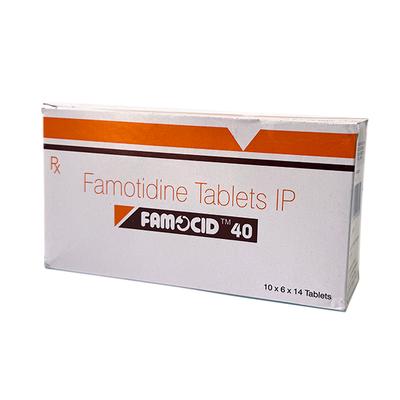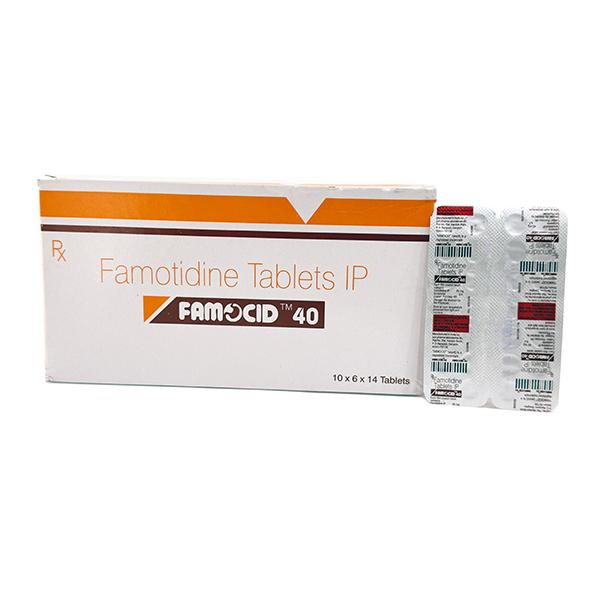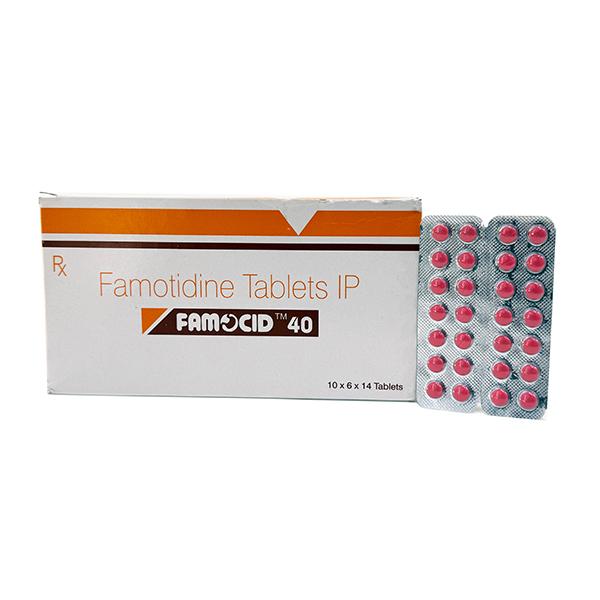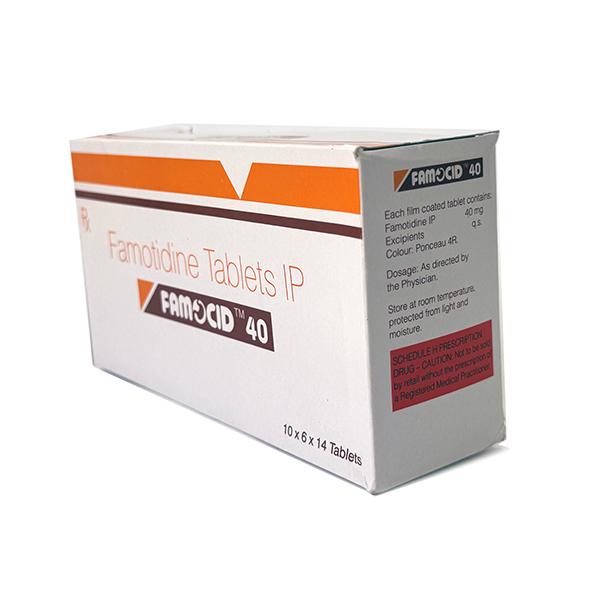

Netmeds First Membership
Quick Links
Introduction About FAMOCID 40MG TABLET
Famocid 40 mg Tablet is a commonly prescribed acid-reducing medicine that contains famotidine, a histamine-2 (H2) receptor blocker. It is typically used to help manage conditions related to excess stomach acid, such as acidity, sour burps, gastric discomfort, and acid reflux. Individuals who frequently experience burning in the chest after meals or discomfort during bedtime due to acid buildup may find this medicine beneficial under medical guidance.
This tablet works by reducing the production of acid in the stomach. Famotidine blocks the H2 receptors in the stomach lining, which are responsible for signalling acid release. Clinical studies have shown that H2 blockers like famotidine can reduce gastric acidity within 1 hour and offer sustained relief for up to 12 hours. Famocid 40 mg may be especially suitable for adults who experience recurring acid-related discomfort, those with a diagnosed acid-peptic condition, or individuals sensitive to dietary triggers such as spicy, oily, or late-night meals.
Famocid 40 mg should be used cautiously in those with kidney problems, older adults, or those taking multiple medications, due to possible drug interactions. If you experience black stools, vomiting with blood, or ongoing abdominal pain, seek immediate medical attention. Use during pregnancy or breastfeeding should be based on medical recommendation only. Commonly reported side effects include headache, constipation, diarrhoea, and dizziness. If symptoms persist or worsen, consult your healthcare provider promptly.
Uses Of FAMOCID 40MG TABLET
- Stomach ulcers (gastric or duodenal ulcers)
- Reflux oesophagitis
- Zollinger−ellison syndrome (recurrent ulcers and tumours in the stomach and intestines)
Benefits of FAMOCID 40MG TABLET
Famocid 40 for Gastric Acid
Famocid 40 mg helps reduce the amount of acid made by the stomach. It contains famotidine, which belongs to a group of medicines called H2 blockers. By lowering acid levels, it supports relief from sour burps, burning in the chest, and irritation caused by excess acid. Famocid 40 is often taken before meals or bedtime, as advised by a doctor, to ease gastric acid buildup.
Famocid 40 for Indigestion
Indigestion can cause bloating, stomach discomfort, and a heavy feeling after meals. Famocid 40 helps manage these symptoms by reducing acid irritation in the stomach lining. It is often taken when meals feel hard to digest or cause heartburn. For best results, use under medical guidance and combine with lighter meals and lifestyle changes.
Famocid 40 Tablet for Gastric Discomfort
Famocid 40 mg is commonly used to ease general gastric discomfort such as burning, stomach fullness, or pain caused by acid irritation. It works by controlling acid secretion, which may support better digestion and relief from uneasiness. People with recurring discomfort often take Famocid 40 before meals, especially if spicy or heavy food triggers symptoms.
How FAMOCID 40MG TABLET Works
Mechanism of Famocid 40 Tablet
Famocid 40 contains famotidine, which belongs to a group of medicines called H2-receptor antagonists. It works by blocking histamine-2 receptors in the stomach lining. This reduces the production of gastric acid and helps relieve symptoms like acidity, bloating and heartburn caused by excess acid.
How Does Famotidine Block Acid Production?
Famotidine blocks the H2 receptors on the cells of the stomach wall. These receptors normally respond to a chemical called histamine, which triggers acid production. By blocking this signal, famotidine reduces acid release, making the stomach environment less acidic and more comfortable.
How to use FAMOCID 40MG TABLET
Famocid 40 mg Tablet: How to Use
- Take the tablet by mouth with a glass of water
- Do not crush or chew the tablet
- Follow the dose and timing as advised by your doctor
- Can be taken once or twice daily, depending on the condition
- Use at the same time each day for best results
- Complete the full course even if symptoms improve early
When to Take Famocid 40 mg – Before or After Food
- Usually taken before meals if acid-related symptoms occur after eating
- Can also be taken at bedtime to manage nighttime discomfort
- Take it on an empty stomach if recommended by your doctor
- Consistency in timing improves its effectiveness
- Avoid taking it right after heavy or spicy meals unless advised
What if I forgot to take FAMOCID 40MG TABLET
- Take the missed dose as soon as you remember
- Skip the missed dose if it’s almost time for your next scheduled dose
- Do not double up to make up for the missed dose
- Stick to your regular dosing schedule to maintain acid control
- If you miss doses often, set a reminder or use a medication tracker
- Talk to your doctor if you’re unsure what to do after a missed dose
Overdose
If you or anyone else accidentally takes too much of FAMOCID 40MG TABLET, consult your doctor immediately or visit the nearby hospital.
Side Effects Of FAMOCID 40MG TABLET
Common side effects of Famocid 40mg Tablet
- headache
- dizziness
- constipation
- diarrhoea
When to Seek Medical Attention?
Stop taking FAMOCID 40MG TABLET and contact your doctor immediately if you experience any of the following side effects:
- Severe or persistent stomach pain that doesn't improve with use
- Black or tarry stools, or presence of blood in vomit
- Unexplained weight loss or fatigue while taking the medicine
- New or worsening chest pain, difficulty swallowing, or ongoing heartburn
- Allergic reactions such as rash, swelling of face/lips, itching, or breathing difficulty
- Signs of kidney issues like swelling in legs, reduced urine, or back pain
- Confusion, dizziness, or unusual tiredness, especially in older adults
How To Manage Side Effects
Constipation
- Drink a glass of warm water immediately after waking up in an empty stomach. And it helps to stimulates bowel movement and softens stool.
- Rich in natural fibre will acts as a mild natural laxative.
- Soak 5–6 raisins or 2 dried figs overnight; eat on an empty stomach in the morning.
Diarrhea
- Diarrhoea can cause dehydration, so drink plenty of fluids like water, clear broths, and coconut water. Oral Rehydration Solution (ORS) is ideal to replace lost electrolytes
- Mix 1 litre of clean water with 6 teaspoons of sugar and ½ teaspoon of salt. Sip slowly throughout the day to restore sodium and glucose levels.
Warning & Precautions
Pregnancy
Consult your doctorFAMOCID 40MG TABLET is not recommended for use in pregnant women or women planning to have a baby unless your doctor thinks the benefits outweigh the risks. Consult your doctor before taking it.
Breastfeeding
ContraindicatedFAMOCID 40MG TABLET is generally not recommended for use in breastfeeding women as it may pass through the breast milk. Consult your doctor before taking it.
Driving and Using Machines
Use with CautionDo not drive or operate any machines if you feel dizzy or have a headache after taking FAMOCID 40MG TABLET.
Kidney
Use with CautionFAMOCID 40MG TABLET should be taken with caution in patients with kidney disease. The dose will be adjusted by your doctor. Consult your doctor before taking it.
Allergy
ContraindicatedDo not take FAMOCID 40MG TABLET if you are allergic to Famotidine or any other ingredients of this medicine.
Use In Pediatrics
ContraindicatedFAMOCID 40MG TABLET is not recommended for use in children. Consult your doctor before taking it.
Other Warnings for FAMOCID 40MG TABLET
Before taking FAMOCID 40MG TABLET, inform your doctor if you:
- have a tumour (malignant) in your stomach
- have lactose intolerance
Who should not take [GBNKEYWORD
FAMOCID 40MG TABLET is not recommended for use if you:
- Those with a history of stomach cancer, unless evaluated by a healthcare provider
- People with unexplained weight loss, black stools, or persistent vomiting
Safety Advice
- Do not take without a doctor’s advice if you have kidney problems, liver disease, or a history of stomach cancer.
- Use caution if you are elderly, as prolonged use can affect vitamin B12 levels and cause confusion in some cases.
- Avoid using Famocid regularly for more than 14 days unless told by a healthcare provider.
- Inform your doctor if you're using NSAIDs, blood thinners, antifungals, or HIV medications, as interactions may occur.
- Do not combine Famocid with other acid-reducing drugs (like omeprazole or antacids) without medical advice.
- It is generally safe in pregnancy when recommended by a doctor but always confirm before use.
- Famocid passes in small amounts in breast milk, so consult your doctor if breastfeeding.
- Do not take the tablet if the packaging is damaged or expired.
- Alcohol and smoking can reduce the effectiveness of Famocid—limit or avoid both.
- If you experience rash, difficulty breathing, swelling, or severe dizziness stop the tablet and seek help immediately.
Diet and Lifestyle Advice
- Eat smaller meals more frequently instead of large, heavy meals to reduce stomach acid production.
- Avoid spicy, oily, fried, and acidic foods (like citrus fruits, tomatoes, vinegar) that can irritate the stomach lining.
- Limit or avoid caffeine-containing drinks like coffee, tea, cola, and energy drinks as they can trigger acidity.
- Stay away from carbonated drinks, which may worsen acid reflux symptoms.
- Do not lie down immediately after meals; wait at least 2–3 hours before going to bed.
- Maintain a healthy weight, as excess abdominal fat can increase pressure on the stomach and cause acid backflow.
- Wear loose-fitting clothes to avoid pressure on your stomach, especially after eating.
- Drink plenty of water throughout the day to support digestion and prevent dehydration.
- Try gentle exercises like walking after meals to improve digestion; avoid vigorous workouts right after eating.
1. How is Famocid 40 mg different from Rantac 150 mg?
|
Parameter |
Famocid 40 mg |
Rantac 150 mg |
|
Generic Name |
Famotidine |
Ranitidine |
|
Medicine Class |
H2 Receptor Blocker |
H2 Receptor Blocker |
|
Strength Available |
40 mg |
150 mg |
|
Mechanism of Action |
Reduces stomach acid by blocking histamine (H2) receptors in the stomach lining |
Similar action — reduces acid by blocking H2 receptors |
|
Onset of Action |
Usually within 1 hour |
Usually within 1 hour |
|
Duration of Effect |
Lasts up to 10–12 hours |
Lasts around 8–10 hours |
|
Formulation Available |
Tablets, Oral Suspension |
Tablets, Syrup |
|
Prescribing Preference |
Often used when a more targeted or longer-acting option is preferred |
Previously widely used, now less commonly recommended |
|
Regulatory Note |
Commonly used in current clinical practice |
Usage reduced in some countries due to earlier safety-related advisories |
|
Doctor Consultation |
Always advised before use |
Always advised before use |
2. Famocid 40 mg vs Pantoprazole 40 mg
|
Parameter |
Famocid 40 mg (Famotidine) |
Pantoprazole 40 mg (Common brand: Pan 40) |
|
Medicine Class |
H2 Receptor Antagonist (H2 Blocker) |
Proton Pump Inhibitor (PPI) |
|
Primary Action |
Reduces acid by blocking histamine (H2) receptors in stomach lining |
Reduces acid by inhibiting the proton pumps in stomach cells |
|
Onset of Action |
Starts working within 1 hour |
Starts working in 2–3 hours |
|
Duration of Action |
Lasts for 10–12 hours |
Long-acting, can last up to 24 hours |
|
Best Time to Take |
Before meals or bedtime (as advised) |
Preferably before breakfast or meals |
|
Typical Use Cases |
Mild to moderate acid-related discomfort |
Moderate to severe acid-related issues (as directed) |
|
Formulation |
Tablet, oral suspension |
Tablet, dispersible tablet, injection |
|
Tolerability |
Generally, well tolerated |
Also well tolerated, though slower onset |
|
Doctor Preference |
Often preferred for quick relief or short-term use |
Preferred for long-term acid suppression under supervision |
|
Pregnancy Safety |
Used cautiously with medical advice |
Used cautiously with medical advice |
Drug - Drug interaction
1. Ketoconazole or Itraconazole (antifungal medicines):
These medicines need a certain level of stomach acid to be absorbed properly. When taken with Famocid, their absorption may decrease.
Management: Take the antifungal at least 2 hours before taking Famocid or consult your doctor about the best schedule.
2. Atazanavir (used for HIV management):
Famocid can reduce the absorption of Atazanavir by raising stomach pH, which may affect its effectiveness.
Management: This combination is generally avoided. Your healthcare provider may suggest an alternative acid reducer or adjust your regimen accordingly.
3. Iron Supplements (such as ferrous sulfate):
Iron needs an acidic environment for good absorption. Famocid may lower stomach acidity, reducing how much iron your body absorbs.
Management: Try taking iron supplements at least 2 hours before or after Famocid to improve absorption.
4. Dasatinib and Erlotinib (anti-cancer medicines):
These medicines are sensitive to changes in stomach acidity. Famocid may reduce their absorption, which can interfere with their effectiveness.
Management: Avoid combining them. Doctors often recommend using these medications without acid-lowering agents like Famocid unless necessary.
5. Sucralfate (used for ulcer protection):
When taken together, Sucralfate can interfere with the absorption of Famocid.
Management: Take Sucralfate at least 2 hours after Famocid for better effectiveness of both medicines.
6. Probenecid (used for gout):
Probenecid can increase the blood levels of Famotidine by reducing its elimination from the body.
Management: Monitoring and possible dose adjustment may be advised by your healthcare provider.
7. Theophylline (used for asthma or respiratory issues):
Famocid may affect the blood levels of Theophylline, leading to increased or decreased activity.
Management: Your doctor may monitor symptoms or consider an alternative if needed.
Drug - Food interaction
1. Caffeinated Beverages (Tea, Coffee, Cola):
These drinks can stimulate acid production and irritate the stomach lining, potentially reducing the comfort level when taking Famocid.
Management: Try to reduce or avoid excessive caffeine intake during Famocid use. Opt for non-caffeinated or herbal drinks if needed.
2. Spicy or Fried Foods:
Such foods may worsen acidity symptoms even when on acid-reducing medicines. They don’t directly interact with Famocid but can trigger acid build-up or discomfort.
Management: Eat smaller, lighter meals and avoid foods that typically cause discomfort. Monitor individual triggers and adjust your diet accordingly.
3. Alcohol:
Alcohol can irritate the stomach lining and counteract the acid-reducing benefits of Famocid. It may also increase the risk of gastric side effects.
Management: Limit or avoid alcohol while taking Famocid to support better stomach comfort and healing.
4. Citrus Fruits (Oranges, Lemons, Grapefruit):
Citrus fruits are acidic and may worsen acid-related symptoms despite the use of Famocid.
Management: Consume in moderation or avoid if they cause discomfort. Choose non-citrus fruits like bananas or melons during sensitive periods.
5. High-Fat or Heavy Meals:
Large, greasy meals may delay stomach emptying and worsen symptoms like bloating or indigestion.
Management: Eat smaller, frequent meals and avoid lying down immediately after eating. Take Famocid as directed, usually before meals or at bedtime.
6. Calcium-Rich or Iron-Rich Foods (when taken with supplements):
While regular food is less likely to cause a direct issue, calcium or iron supplements taken with Famocid may absorb poorly.
Management: If you're on supplements, take them at a different time than Famocid (gap of 2 hours is ideal) for better absorption.
Synopsis
|
Drug |
Famotidine |
|
Pharmacological Category |
H2 receptor antagonists |
|
Therapeutic indication |
Stomach ulcers, Reflux esophagitis, Zollinger-Ellison Syndrome |
|
Dosage Forms |
Tablet, Soft Gel, Soflet |
More Information
- Keep FAMOCID 40MG TABLET out of reach of children
- Store at room temperature not above 25°C
FAQs About FAMOCID 40MG TABLET
Q: What is Famocid 40 mg used for?
A: Famocid 40 mg helps reduce excess stomach acid. It’s often taken to ease acidity, heartburn, or discomfort from acid buildup. Your doctor may suggest it if you have an acid-related digestive issue.
Q: Is Famocid 40 mg a painkiller?
A: No, Famocid is not a painkiller. It works by reducing stomach acid and relieving related symptoms, not by blocking pain directly.
Q: Can I exercise while taking Famocid?
A: Yes, light to moderate exercise is safe. In fact, regular activity can help with digestion and reduce acidity in some cases.
Q: Can children take Famocid 40 mg?
A: Famocid may be prescribed to children in lower doses. Only give it to children under a doctor’s supervision.
Q: Can I take other medicines with Famocid?
A: Some medicines may interact with Famocid, especially antifungals or iron supplements. Always share your medicine list with your doctor or pharmacist.
Q: Does Famocid cause constipation or diarrhoea?
A: Both constipation and diarrhoea are possible but not common. Drink enough fluids and eat a fibre-rich diet to manage these effects.
Q: Is Famocid 40 mg better than pantoprazole or omeprazole?
A: Famocid 40mg Tablet works differently from other acid reducers like pantoprazole. Your doctor will decide the best option for you based on your condition and symptoms.
Q: How does Famocid 40 mg work?
A: Famocid contains famotidine, which blocks a chemical (histamine) that signals the stomach to make acid. This helps reduce acid levels and gives relief from burning or bloating.
Q: When should I take Famocid 40 mg?
A: It’s usually taken once or twice daily, as advised by your doctor. You may take it before meals or at bedtime depending on your symptoms. Follow the timing given on your prescription.
Q: Can I take Famocid 40 mg after meals?
A: Yes, but it's generally more effective when taken before a meal or at bedtime. This helps control acid production before it starts.
Q: What are the common side effects of Famocid 40 mg?
A: Some people may experience headache, dizziness, constipation, or diarrhoea. These effects are usually mild and temporary. Inform your doctor if they persist or bother you.
Q: Is Famocid 40 mg safe for daily use?
A: Yes, it can be used daily for short or long periods, depending on your condition. Long-term use should be under medical supervision to avoid side effects or nutrient issues.
Q: Can I take Famocid 40 mg with food?
A:Yes, it can be taken with or without food. If you have a sensitive stomach, taking it with food or water may feel more comfortable.
References
1. KD. Tripathi. Gastrointestinal Drugs. Essentials of medical pharmacology. Seventh edition. 2013. Page – 650.
2. P A Abraham, J A Opsahl, C E Halstenson, A N Chremos, G R Matzke, W F Keane. The effect of famotidine on renal function in patients with renal insufficiency. NIH. National Library of Medicine, National centre for biotechnology information. Pubmed.gov. Sept 1987. [Accessed on 21st July 2025] ![]()
3. Kim Nguyen, Graham D. Dersnah, Rajni Ahlawat. Famotidine. NIH. National Library of Medicine, National center for biotechnology information. Pubmed.gov. [Revised in January 2024] [Accessed on 21st July 2025] 












